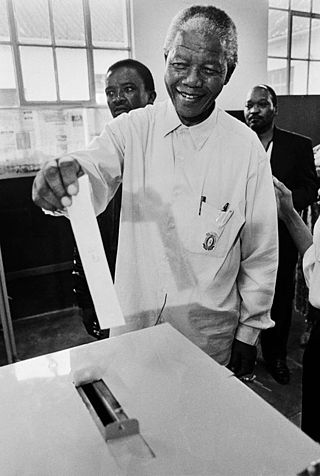Related Research Articles
The Republic of South Africa is a unitary parliamentary democratic republic. The President of South Africa serves both as head of state and as head of government. The President is elected by the National Assembly and must retain the confidence of the Assembly in order to remain in office. South Africans also elect provincial legislatures which govern each of the country's nine provinces.

The National Party, also known as the Nationalist Party, was a political party in South Africa founded in 1914 and disbanded in 1997. The party was an Afrikaner ethnic nationalist party that promoted Afrikaner interests in South Africa. However, in 1990 it became a South African civic nationalist party seeking to represent all South Africans. It first became the governing party of the country in 1924. It merged with its rival, the SAP, during the Great Depression, and a splinter faction became the official opposition during World War II and returned to power and governed South Africa from 4 June 1948 until 9 May 1994.

The apartheid system in South Africa was ended through a series of bilateral and multi-party negotiations between 1990 and 1993. The negotiations culminated in the passage of a new interim Constitution in 1993, a precursor to the Constitution of 1996; and in South Africa's first non-racial elections in 1994, won by the African National Congress (ANC) liberation movement.

Roelof Petrus MeyerGCOB is a South African politician and businessman. Originally a member of the National Party, he is known for his prominent role in the negotiations to end the apartheid system in South Africa. He later co-founded the United Democratic Movement.
Denis John Worrall is a South African academic, businessman, and former politician and diplomat.
Although the Democratic Alliance of South Africa in its present form is fairly new, its roots can be traced far back in South African political history, through a complex sequence of splits and mergers.

The Interim Constitution was the fundamental law of South Africa from the first non-racial general election on 27 April 1994 until it was superseded by the final constitution on 4 February 1997. As a transitional constitution it required the newly elected Parliament to also serve as a constituent assembly to adopt a final constitution. It made provision for a major restructuring of government as a consequence of the abolition of apartheid. It also introduced an entrenched bill of rights against which legislation and government action could be tested, and created the Constitutional Court with broad powers of judicial review.

Nelson Mandela took the oath as President of South Africa on 10 May 1994 and announced a Government of National Unity on 11 May 1994. The cabinet included members of Mandela's African National Congress, the National Party and Inkatha Freedom Party, as Clause 88 of the Interim Constitution of South Africa required that all parties winning more than 20 seats in National Assembly should be given representation in the cabinet. Upon its formation it comprised 27 ministers, with a further 13 deputy ministers.
Hendrik Jacobus "Hennie" Bekker is a South African politician who served in the Parliament of South Africa from 1987 to 2009, excepting a brief hiatus in the KwaZulu-Natal Provincial Legislature from 2003 to 2004. He represented the National Party (NP) until the end of apartheid in 1994, after which he joined the Inkatha Freedom Party (IFP).
Letsau Nelson Diale was a South African politician and anti-apartheid activist from Limpopo. He joined the African National Congress (ANC) in 1956 and served eight years' imprisonment on Robben Island, from 1964 to 1972, for his work with Umkhonto we Sizwe. After the end of apartheid, he represented the ANC in the National Council of Provinces from 1994 to 1999 and in the National Assembly from 1999 to 2014.
Judy Chalmers is a retired South African politician and activist who represented the African National Congress (ANC) in the National Assembly from 1994 to 2009. During apartheid, she was the chairperson of the Black Sash in the Eastern Cape.
Johannes Petrus Izak "Sakkie" Blanché is a South African politician who served in Parliament both before and after the end of apartheid, representing variously the National Party (NP), the Federal Alliance (FA), and the Democratic Alliance (DA). He also served in the Gauteng Executive Council.
Loretta Jacobus, formerly known as Loretta Bastardo-Ibanez, is a South African politician who served as Deputy Minister of Correctional Services from February 2006 to May 2009. She represented the African National Congress (ANC) in the National Assembly from 2004 to 2013.
Patrick Cecil McKenzie is a South African politician who represented the African National Congress (ANC) in the Western Cape Provincial Parliament until his retirement in November 2012, holding several positions in the Western Cape Executive Council during that time. Between 1994 and 1999, before he joined the ANC, he represented the National Party, including for a brief period as Minister of Welfare and Population Development in Nelson Mandela's Government of National Unity in 1996. Before that, he represented the Labour Party in the Tricameral Parliament from 1983 to 1994.
Mario George Masher was a South African politician from the Western Cape. He represented the National Party (NP) in the National Assembly from 1994 to 1999, when he defected to the African National Congress (ANC). A teacher by profession, he formerly represented the Labour Party in the Tricameral Parliament. After joining the ANC, he was appointed South African Consul-General to Hong Kong and Macau.
Adriaan Hermanus "Maans" Nel is a South African politician who served in the National Assembly from 1994 to 2009, representing the Northern Cape. He was a member of the National Party (NP) and New National Party (NNP) until March 2003, when he crossed the floor to the Democratic Alliance (DA).
Jan Hendrik "Jannie" Momberg was a South African politician, businessman, and sports administrator who served in the South African Parliament from 1989 to 2001. A former member of the National Party (NP), Momberg's opposition to apartheid led him to become a founding member of the Democratic Party in 1989, and he joined the African National Congress (ANC) in 1992.
Barend Leendert "Boy" Geldenhuys is a retired South African politician and diplomat who represented the National Party (NP) and New National Party (NNP) in the National Assembly from 1994 to 2004. He served as the leader of the NNP caucus from 2002 to 2004. After losing his seat in the 2004 general election, he was appointed as South African Ambassador to Jordan. A former minister in the Dutch Reformed Church, Geldenhuys also represented the NP in the apartheid-era House of Assembly.
Bhadrakumar Ghaloo "Bhadra" Ranchod is a retired South African politician, diplomat, and lawyer who served as Deputy Speaker of the National Assembly from May 1994 to March 1996. He represented the National Party and previously served as Minister of Tourism for a brief period from 1993 to 1994 under President F. W. de Klerk.
Cyril Maurice George was a South African politician who represented the National Party (NP) and New National Party (NNP) in the National Assembly from 1994 to 1999. He later served as a local councillor in eThekwini Metropolitan Municipality, representing variously the NNP, the Democratic Alliance (DA), and the African Christian Democratic Party (ACDP).
References
- 1 2 "Minutes of proceedings of the Constitutional Assembly" (PDF). Department of Justice and Constitutional Development. 24 May 1994. Retrieved 2 April 2023.
- ↑ "The year of RDP delivery". The Mail & Guardian. 15 March 1996. Retrieved 19 April 2023.
- 1 2 "Alant, Theo". The O'Malley Archives. Retrieved 19 April 2023.
- 1 2 "Landboulex se benoemdes laat wenkbroue lig". Landbou (in Afrikaans). 12 September 2002. Retrieved 19 April 2023.